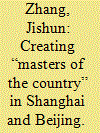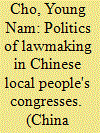| Srl | Item |
| 1 |
ID:
141109


|
|
|
|
|
| Summary/Abstract |
The first round of elections for local people's congresses was an important moment in the Chinese Communist Party's efforts to create an image of the common people as the “masters of the country.” Lower-class people were portrayed in official propaganda as “masters” who were also supporters of the Party. Yet, those “masters” nevertheless displayed diverse political attitudes that were influenced by different local political cultures, particularly in Beijing and Shanghai. The official propaganda promoting the “masters” was a Communist strategy to gain political legitimacy that ironically created the foundation for heterodox mass movements.
|
|
|
|
|
|
|
|
|
|
|
|
|
|
|
|
| 2 |
ID:
123961


|
|
|
|
|
| Publication |
2013.
|
| Summary/Abstract |
This article joins the debate on the increasingly consultative nature of Chinese politics by adding the role of the Local People's Congress (LPC). In contrast to previous research on LPCs that emphasizes their increasing importance and improved capacity, this article shows that the central Party leadership, in order to uphold its monopoly of the cadre management system, has reduced LPC standing committees' (LPCSC) influence over cadres. The article analyses the consequences of the People's Congress Standing Committee Supervision Law passed in 2006 and the policy of appointing the first Party secretary as LPCSC chairperson. A case study of the changes over a ten-year period (1998-2009) in a county People's Congress (PC) in Zhejiang illustrates how the change in leadership and the implementation of the Supervision Law effectively stopped previously initiated reforms to strengthen the LPC and crippled the LPCSCs' capacity to supervise government cadres. The article concludes that the policies adopted in order to strengthen Party control over LPCSCs have resulted in a decrease of horizontal accountability and confirm the image of an emerging consultative authoritarian political system.
|
|
|
|
|
|
|
|
|
|
|
|
|
|
|
|
| 3 |
ID:
074814


|
|
|
|
|
| Publication |
2006.
|
| Summary/Abstract |
This article analyses the politics of lawmaking in Chinese provincial people's congresses. When the introduction of a market economy and governance according to law policy compelled the Party to open the political arena of lawmaking, the political process in China became more consultative and sophisticated, and political actors more diversified and competitive. In local legislative politics, government agencies, legislature committees and various social organizations began to take part in open-ended contestation of persuasion, and they frequently clashed and co-operated with each other to augment their organizational interests. Provincial people's congresses, after having secured their lawmaking authority since the late 1990s, have played two distinct roles: as co-ordinators of conflicts of interests and as representatives of various social groups' voices.
|
|
|
|
|
|
|
|
|
|
|
|
|
|
|
|